

Planetary Ball Mill RM 200 - The ideal solution for precision grinding of materials
The Planetary Ball Mill PM 200 is a powerful benchtop model with 2 grinding stations for grinding jars with a nominal volume of 12 ml to 125 ml.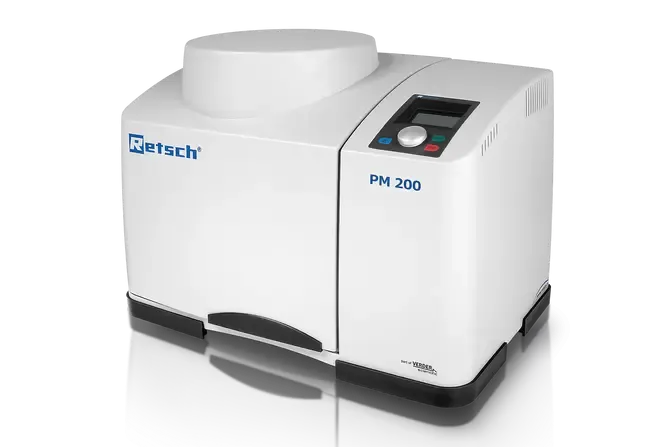
TWO GRINDING STATIONS FOR STANDARD APPLICATIONS
- Max. speed 650 rpm
- Up to 10 mm feed size and 0.1 µm final fineness
- 2 grinding stations for jars from 12 ml up to 125 ml, jars of 12 and 25 ml can be stacked (two jars each)
- GrindControl to measure temperature and pressure inside the jar.
- Aeriation lids to control the atmosphere inside the jar
- Storable SOPs and cycle programs, 5 different jar materials for dry and wet grinding
FAST & POWERFUL
- Loss-free size reduction down to the submicron range
- Wet grinding yields particle sizes in the nanometer range (<100 nm)
- Variable speed from 100 to 650 rpm,
- speed ratio 1:-2
- Grinding with up to 33.3 x acceleration of gravity
- Batch-wise processing with max. 2 x 50 ml sample
- Wide range of materials for contamination free grinding
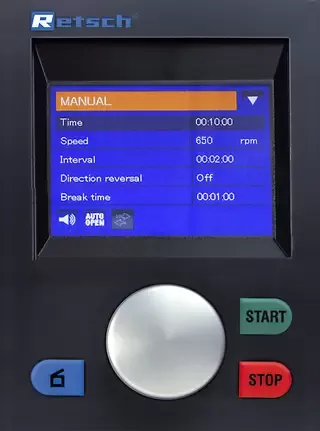
REPRODUCIBILITY, SAFETY AND EASY HANDLING
- Reproducible results due to speed control
- Easy and safe clamping of grinding jars
- The Safety Slider prevents starting the machine without securely clamped jars
- Perfect stability on the lab bench thanks to FFCS technology
- Innovative counterweight and imbalance sensor for unsupervised operation
- Comfortable parameter setting via display and ergonomic 1-button operation
- Automatic grinding chamber ventilation
- 10 SOPs can be stored, programmable starting time
- Power failure backup ensures storage of remaining processing time
SETTINGS & OPTIONS
- Dry and wet grinding possible
- Suitable for long-term trials, 99 h max.
- Interval operation allows for cooling breaks
- Direction reversal helps to minimize caking effects
WET AND NANO-SCALE GRINDING WITH THE PM 200
Wet grinding is used to obtain particle sizes below 5 µm, as small particles tend to get charged on their surfaces and agglomerate, which makes further grinding in dry mode difficult. By adding a liquid or dispersant the particles can be kept separated.
The graphic shows the result of grinding barium titanate at 500 rpm in the PM 200. After 5 h of pulverization in heptane and oleic acid mixture with 0.5 mm grinding balls, the D90 value of the original sample was reduced from 15 µm to 95 nm.
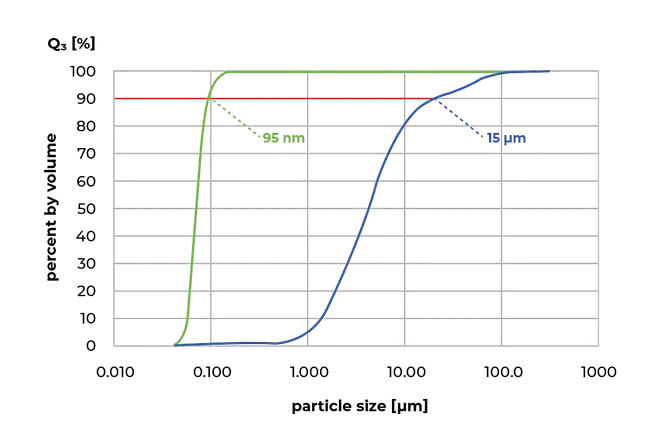
Grinding of barium titanate in heptane and oleic acid mixture with 0.5 mm grinding balls.
Blue curve: original sample; green curve: pulverized sample after 5 h.
TYPICAL SAMPLE MATERIALS
RETSCH planetary ball mills are perfectly suitable for size reduction of, for example, alloys, bentonite, bones, carbon fibres, catalysts, cellulose, cement clinker, ceramics, charcoal, chemical products, clay minerals, coal, coke, compost, concrete, electronic scrap, fibres, glass, gypsum, hair, hydroxyapatite, iron ore, kaolin, limestone, metal oxides, minerals, ores, paints and lacquers, paper, pigments, plant materials, polymers, quartz, seeds, semi-precious stones, sewage sludge, slag, soils, tissue, tobacco, waste samples, wood, etc.
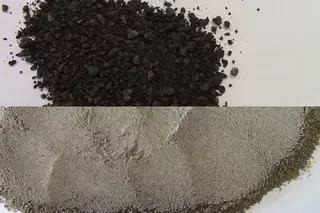
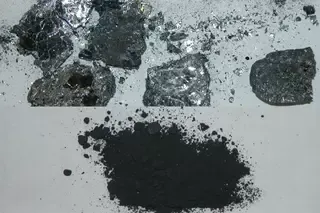
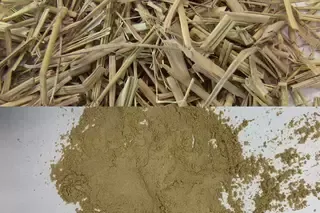
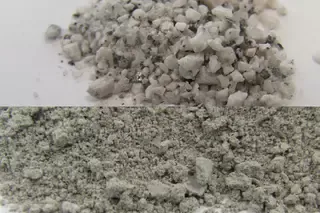
| Medium-hard: biomass
35 g sample 125 ml stainless steel grinding jars 7 x 20 mm stainless steel grinding balls 15 min at 500 rpm | Brittle: tin sulfide
52 g sample 125 ml agate grinding jars 50 x 10 mm agate grinding balls 60 min at 550 rpm 10 min intervals and direction reversal | Fibrous: straw
7 g sample 125 ml zirconium oxide grinding jars 50 x 10 mm zirconium oxide grinding balls 40 min at 300 rpm 10 min intervals and direction reversal | Hard: natural rocks
|
TECHNICAL DATA
| Applications | pulverizing, mixing, homogenizing, colloidal milling, mechanical alloying, mechanosynthesis, nano grinding |
| Field of application | agriculture, biology, chemistry, construction materials, engineering / electronics, environment / recycling, geology / metallurgy, glass / ceramics, medicine / pharmaceuticals |
| Feed material | soft, hard, brittle, fibrous - dry or wet |
| Size reduction principle | impact, friction |
| Material feed size* | < 4 mm |
| Final fineness* | < 1 µm, for colloidal grinding < 0.1 µm |
| Batch size / feed quantity* | max. 2 x 50 ml |
| No. of grinding stations | 2 |
| Speed ratio | 1 : -2 |
| Sun wheel speed | 100 - 650 min-1 |
| Effective sun wheel diameter | 157 mm |
| G-force | 37,1 g |
| Type of grinding jars | EasyFit, optional areation covers, safety closure devices |
| Material of grinding tools | hardened steel, stainless steel, tungsten carbide, agate, sintered aluminum oxide, silicon nitride, zirconium oxide |
| Grinding jar sizes | 12 ml / 25 ml / 50 ml / 80 ml / 125 ml |
| Stackable grinding jars | 12 ml / 25 ml |
| Setting of grinding time | digital, 00:00:01 to 99:59:59 |
| Interval operation | yes, with direction reversal |
| Interval time | 00:00:01 to 99:59:59 |
| Pause time | 00:00:01 to 99:59:59 |
| Storable SOPs | 10 |
| Measurement of input energy possible | yes |
| Interface | RS 232 / RS 485 |
| Drive | 3-phase asynchronous motor with frequency converter |
| Drive power | 750 W |
| Electrical supply data | different voltages |
| Power connection | 1-phase |
| Protection code | IP 30 |
| Power consumption | ~ 1250 W (VA) |
| W x H x D closed | 640 x 480 (780) x 420 mm |
| Net weight | ~ 76 kg |
| Standards | CE |
| Patent / Utility patent | SafetySlider (DE 202008008473) |
